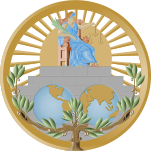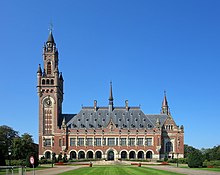
Back Internasionale Geregshof Afrikaans Internationaler Gerichtshof ALS Cort Internacional de Chusticia AN محكمة العدل الدولية Arabic لمحكامة د لعدل الدولية ARY محكمة العدل الدوليه ARZ আন্তঃৰাষ্ট্ৰীয় ন্যায়ালয় Assamese Corte Internacional de Xusticia AST अंतर्राष्ट्रीय न्यायालय AWA Beynəlxalq Ədalət Məhkəməsi Azerbaijani
| International Court of Justice | |
|---|---|
| Cour internationale de justice | |
 Emblem of the International Court of Justice | |
 The Peace Palace, the seat of the court | |
 | |
| 52°05′11.8″N 4°17′43.8″E / 52.086611°N 4.295500°E | |
| Established | June 26, 1945 |
| Jurisdiction | Worldwide, 193 state parties |
| Location | The Hague, Netherlands |
| Coordinates | 52°05′11.8″N 4°17′43.8″E / 52.086611°N 4.295500°E |
| Authorised by | |
| Judge term length | 9 years |
| Number of positions | 15 |
| Website | icj-cij |
| President | |
| Currently | Nawaf Salam |
| Since | 6 February 2024 |
| Vice President | |
| Currently | Julia Sebutinde |
| Since | 6 February 2024 |
The International Court of Justice (ICJ; French: Cour internationale de justice, CIJ), or colloquially the World Court, is the only international court that adjudicates general disputes between nations, and gives advisory opinions on international legal issues. It is one of the six organs of the United Nations (UN),[1] and is located in The Hague, Netherlands.
The ICJ is the successor of the Permanent Court of International Justice (PCIJ), which was established in 1920 by the League of Nations. After the Second World War, the League and the PCIJ were replaced by the United Nations and ICJ, respectively. The Statute of the ICJ, which sets forth its purpose and structure, draws heavily from that of its predecessor, whose decisions remain valid. All member states of the UN are party to the ICJ Statute and may initiate contentious legal cases; however, advisory proceedings may be submitted only by certain UN organs and agencies.
The ICJ consists of a panel of 15 judges elected by the UN General Assembly and Security Council for nine-year terms. No more than one judge of each nationality may be represented on court at the same time, and judges collectively must reflect the principal civilizations and legal systems of the world. Seated in the Peace Palace in The Hague, Netherlands, the ICJ is the only principal UN organ not located in New York City.[2] Its official working languages are English and French.
Since the entry of its first case on 22 May 1947, the ICJ has entertained 191 cases through 13 November 2023.[3] Pursuant to Article 59 of the Statute of the International Court of Justice, the court's rulings and opinions are binding on the parties with respect to the particular case ruled on by the court.
- ^ Koh, Steven Arrigg (27 August 2014). "4 Things You Should Know About The Hague". HuffPost. Archived from the original on 18 March 2017. Retrieved 17 March 2017.
- ^ "The Court". International Court of Justice. Archived from the original on 10 January 2018. Retrieved 10 January 2018.
- ^ "Cases". International Court of Justice. Archived from the original on 24 November 2020. Retrieved 6 December 2022.